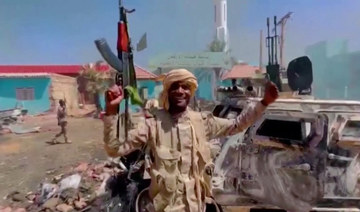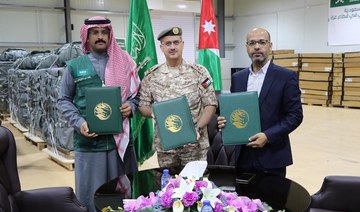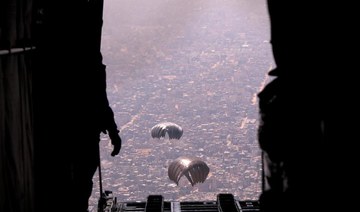CAIRO/DUBAI: The conflict in Sudan hit the two-month mark on Thursday with no sign of a resolution as diplomatic peace efforts hit roadblocks and the risk of a broader ethnic war rises.
Fighting between the army and paramilitary Rapid Support Forces (RSF), which a US diplomat earlier this week described as “suicidal” behavior, has displaced 2.2 million people and killed at least 1,000, an underestimate according to medics.
It has shut down the economy, plunging millions of Sudanese into hunger and dependence on foreign aid, and shattered the health system.
The army and RSF, which together ousted autocrat Omar Al-Bashir in 2019, began fighting in the heart of the capital on April 15 after disagreeing over the integration of their troops under a new transition to democracy.
The fighting has since expanded, hitting key cities in the west of the country, worst of all the city of El Geneina, West Darfur, where activists say 1,100 people have been killed and the UN says 150,000 people have fled to Chad.
On Wednesday, the governor of West Darfur, Khamis Abbakar, accused the RSF and allied Arab militias of carrying out a genocidal attack in El Geneina.
Hours later, Abbakar was killed, and the Sudanese Alliance armed group he led blamed the RSF for killing him while in their custody.
The RSF denied responsibility, saying that Abbakar had actually sought refuge with the forces but that rogue tribal actors had “kidnapped him and killed him in cold blood.”
The killing of Abbakar, who hails from the Masalit tribe he said was targeted by the attacks, threatens to expand the fighting in El Geneina which has already brought the city to its knees.
“I saw many bodies in the streets. No one dares to bury them,” said one man, asking to withhold his name.
Fighting has also broken out in other Darfur state capitals, including Nyala, Elfashir, and Zalingei and the Kordofan cities of El Obeid and Kadugli, threatening to agitate long-simmering ethnic tensions.
“The longer the conflict lasts, it may end up taking an ethnic and regional dimension in ... parts of the country,” said Suliman Baldo of the Sudanese Transparency and Policy Tracker.
The incoming rainy season threatens to make the delivery of already limited assistance and migration of hundreds of thousands out of war zones, often on foot, impossible.
Unsuccessful diplomacy
The RSF evolved out of the janjaweed militias that wreaked havoc in Darfur in the early 2000s, and in 2017 became a legalized government force under commander General Mohamed Hamdan Dagalo.
Fighting between the RSF, which has embedded itself in residential areas of Khartoum, and the army, which has launched extensive artillery and air strikes, shows no signs of letting up.
On Thursday, residents in Khartoum and its neighboring cities Omdurman and Bahri reported clashes, artillery shelling and air strikes near residential areas.
After multiple failed cease-fires, US diplomats earlier this week conceded that negotiations in Jeddah had not been successful and were considering other paths.
IGAD, a regional East African organization, this week also launched a mediation effort chaired by Kenya to bring Dagalo and army chief General Abdel Fattah Al-Burhan together at a meeting Ethiopia said it would host.
But in a statement on Thursday, Sudan’s foreign ministry, controlled by the army, accused Kenya of harboring the RSF, and said it preferred South Sudanese leadership of the initiative.
Meanwhile Khartoum residents have accused RSF soldiers and armed gangs of looting homes. East Khartoum resident Waleed Adam said that two men, one in RSF uniform, showed up at his door pointing an AK-47.
“They trashed my house and stole my money,” he said.
The Combating Violence Against Women Unit, a government agency, said that the victims of most of the rape cases it has documented, which it said represent only 2 percent of real cases, blamed men in RSF uniforms.
The RSF has denied responsibility and says that criminals and Bashir loyalists have been known to steal uniforms.




























